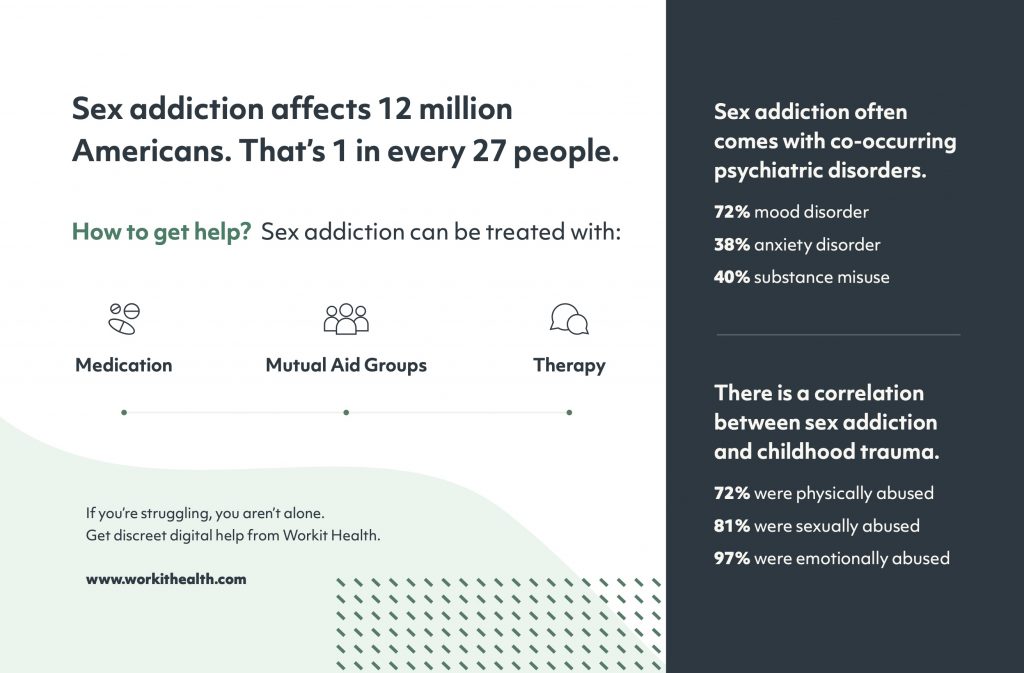Compulsive sexual behavior can interfere with your health, happiness, and relationships. How can you find an in-network clinician or program to help you with sex addiction?
What is sex addiction?
Sex addiction is a type of behavioral addiction defined by, like all addiction, by compulsive behavior continued despite negative consequences. The research on sex addiction isn’t as well established as other types of addiction, meaning that those struggling with compulsive sexual behavior may have a difficult time finding treatment covered by insurance.
The underlying thoughts and feelings associated with sexual addiction are similar to those someone with a drug or alcohol addiction may experience. Sexual addiction is characterized by thoughts about sex or sexual behaviors that interfere with one’s functioning. These thoughts or behaviors may interfere with relationships, employment, and overall self-care practices such as a healthy diet and exercise.
“The underlying thoughts and feelings associated with sexual addiction are similar to those someone with a drug or alcohol addiction may experience.”
Typically someone who is struggling with a sexual addiction needs more and varied types of sexual stimulus to obtain arousal, orgasm, and to feel sexually gratified. Sexual addiction is a physiological addiction, meaning that it impacts the normal functions of the body – namely, the ability to achieve orgasm.
Whether or not an official diagnosis is made, only you know if your sexual behaviors are affecting your life negatively. If you’ve experienced negative consequences from compulsive sexual behavior, you may benefit from sex addiction treatment.
There are many people who engage in sexual activity that is outside the norm for our society, such as bondage or fetishes. While these are not typically viewed as mainstream, the presence of these arousal patterns does not indicate that one has a sexual addiction.
What are the types of treatments available for sex addiction?
Like any addiction, sexual addiction treatment and recovery works differently for everyone. Based on your specific needs and situation, you may find one (or all) of the following treatments helpful for you:
Online Therapy: There are an increasing number of online therapy providers since 2020. When selecting a therapist, make sure to confirm that they work with sex issues.
Inpatient treatment: Inpatient treatment offers a residential environment upon which to focus on recovering from sex addiction. When considering inpatient treatment for sex addiction, remember to ensure that you will be receiving evidence-based therapy during your stay. Inpatient treatment for sex addiction is often best for those who feel they have no control over their addiction, or people who are putting themselves or others at risk due to their addictions and require a higher level of supervision.
Psychotherapy: If you’re concerned you may have a problem and not sure what steps to take to get help, therapy is an affordable and accessible option. A licensed therapist can help you manage your sexual behavior, as well as any co-occurring conditions like depression or anxiety. Although inpatient rehab requires that you leave work and your family, therapy can make a large impact on your addiction without impacting the rest of your life negatively, in just a few hours a week.
A therapist who is working in the sexual addiction realm will want a full sexual history from the client, in addition to family history, employment history, etc. It is important to know about sexual trauma or deviant sexual activity (that which is out of the “norm” for society). By understanding someone’s sexual history, we can begin to understand belief systems surrounding sexuality, distorted thoughts or perceptions of sexuality, and how those thoughts and beliefs relate to sexual arousal.
Therapists use a variety of science-based techniques. Cognitive Behavioral Therapy (CBT) is a useful tool in sexual addiction treatment. The goal of CBT is to examine thoughts, feelings, and behaviors associated with one’s sexual addiction. The thoughts one has about sex impact their feelings. The thoughts and feelings impact how one behaves. By changing thoughts toward sex, we can change the way we feel and behave. Motivational Interviewing, another type of therapy, can help you find your own internal motivation to make change. It’s important to remember that therapists are professionals who are passionate about helping — don’t let your own fears or shame keep you from reaching out.
“The most important thing in sexual issues is to define what is best for you as the client. Setting goals about what you feel is appropriate is the first step and from there, we can figure out how to make that fit into your life,” Counselor and social worker Samantha Keeler explains. “It is also important to recognize that sex and sexual functioning is a normal, natural, and healthy part of the human experience. In fact, 90.9% of people would like their healthcare provider to bring up or ask about their sexual experiences.”
Medication: Medications for sexual addiction include antidepressants, mood stabilizers, or anti-androgens. These medications can reduce compulsive sexual urges. In addition, naltrexone (Vivitrol) can affect the reward circuitry of the brain and reduce compulsive urges. If you’re looking for medication for sexual addiction covered by your insurance provider, reach out to the number of the back of your insurance card to find in-network care.
Support Groups: Many types of peer support groups exist, specifically for sex addiction, and more generally for all types of behavior and substance addictions. Sex Addicts Anonymous is a 12-step program which focuses on sharing experience, strength, and hope to help others overcome sexual addiction or dependency. Sex and Love Addicts Anonymous is a 12-step program that focuses on overcoming the compulsion to either engage in or avoid sex, love, and emotional attachment.
But 12-step programs aren’t the only alternatives. Smart Recovery is a secular, science-based group which can be used to address a variety of addiction, including sex addiction. In addition to Smart Recovery, Buddhist-centered programs like Recovery Dharma and Refuge Recovery offer support for behavioral addictions as well as substance misuse.
How do I know if I will benefit from sex addiction treatment?
If you’re considering sex addiction treatment, this indicates that you’ve probably experienced some negative consequences in your life as a result of your sexual behavior. Remember that treatment isn’t about a certain diagnosis, but rather healthily managing behaviors that are negatively affecting your life. If you’re tired of feeling stuck in the same patterns, reaching out for help can be the first step towards positive change.
If you’re not sure you have a problem with sexual addiction, several screening tests exist online to help you evaluate your behaviors. The Sexual Addiction Screening Test was developed to assist in the assessment of sexually compulsive behavior. Remember that this type of test isn’t a replacement for professional help or advice. Take the results of your test to your clinician so they’re able to provide you with the best care possible.
Does Aetna cover sex addiction treatment?
Your individual policy will determine what exactly is covered under your health insurance plan, with Aetna or any other insurer. Inpatient rehab is often the most costly type of care as everything from housing to meals is provided, but may be the best option for severe sexual compulsion. In many cases, therapy is adequate treatment for sex addiction without any type of inpatient care.
How can you find out how much of your rehab stay Aetna, or another insurance provider, will pay for?
Remember that many inpatient programs advertise as in-network with insurance when this isn’t entirely accurate – they may be hoping to be able to charge you and your insurance company higher out-of-network rates. Reach out to the number of the back of your insurance card to ensure you find quality, in-network sex addiction treatment through Aetna or any other health plan. Keep in mind that inpatient care can be costly. Choosing an in-network facility can ensure your insurance company pays for more of the cost of treatment, and you don’t get stuck with a surprisingly large bill at discharge.
How can I find sex addiction counseling covered by Aetna?
Coverage through Aetna and other insurance providers varies based on your individual plan, so in order to see if sex addiction counseling is covered for you, reach out to the number on the back of your insurance card or log in to your insurance provider’s care portal online. Aetna, or any other insurance provider you are covered under, has trained teams of representatives standing by able to direct you to quality, in-network care.
If you’ve picked an inpatient treatment program or a counselor already, ensure that they’re in-network by calling Aetna (or any other insurance provider) and checking their in-network status.
Taking the first step to get help can feel impossible, but remember that you aren’t alone in struggling with sex addiction. It’s estimated that 5% of the population struggles with a sexual compulsion disorder—and there are many treatments out there that can help.









